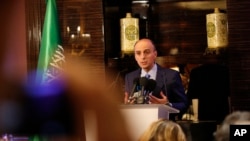Saudi Arabia’s foreign minister, Adel al-Jubeir, is in Pakistan where he held talks with political and military leaders on Thursday to discuss the Sunni-majority kingdom’s rising tensions with regional rival Shi’ite Iran.
Riyadh’s execution of a prominent Shi’ite cleric this past Saturday has fueled tensions across the Middle East and angered Tehran, leading to anti-Saudi demonstrations in Iran and the ransacking of Saudi Arabia’s embassy in the country.
Sunni-dominated Pakistan maintains close ties with both Saudi Arabia and Iran and is seeking to avoid taking sides mainly because it has a large Shi’ite minority in the country.
Peaceful resolution sought
Ahead of the visit of the Saudi foreign minister, Pakistani foreign policy chief, Sartaj Aziz, told parliament Islamabad is a friend of both Saudi Arabia and Iran and is calling for the resolution of differences through peaceful means.
Pakistan supports a Saudi-led alliance against Islamic State militants but insists the nature of Islamabad’s role in the alliance has yet to be defined.
“[The] regional security situation came under discussion during the meeting,” said a military statement that quoted the Pakistani Army chief as telling the Saudi minister.
Pakistani critics and newspaper editorials have urged Prime Minister Nawaz Sharif not to take sides in the conflict, warning it could fuel sectarian tensions at home where Sunni and Shi’ite extremists are already locked in a rivalry that has killed thousands of people in recent years.
Pakistan shares around a 900 kilometer border with Iran while Saudi Arabia has extended crucial financial assistance and oil on deferred payments to Islamabad to support its struggling economy.
Prime Minister Sharif spent several years in Saudi Arabia after he was ousted from power in a military coup in 1999 and exiled to Riyadh along with his entire family.




